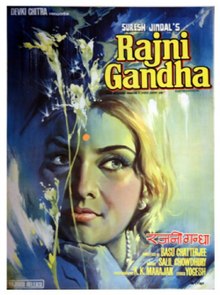Rajnigandha
- Rajnigandha may also refer to Rajnigandha, the flower, also known as tuberose.
| Rajnigandha | |
|---|---|
 | |
| Directed by | Basu Chatterjee |
| Written by | Basu Chatterjee (dialogue) |
| Screenplay by | Basu Chatterjee |
| Story by | Manu Bhandari |
| Produced by | Suresh Jindal, Kamal Saigal |
| Starring | Amol Palekar Vidya Sinha Dinesh Thakur |
| Cinematography | K. K. Mahajan |
| Edited by | G.G. Mayekar |
| Music by | Original Score & Songs: Salil Chowdhury Lyrics for songs: Yogesh |
Release date |
|
Running time | 110 min. |
| Country | India |
| Language | Hindi |
Rajnigandha (Hindi: रजनीगन्धा, Translation: Tuberose) is a Hindi movie directed by Basu Chatterjee and released in 1974. It is based on story "Yehi Sach Hai" by noted Hindi writer Manu Bhandari.[1][2]
The movie stars Amol Palekar, Vidya Sinha and Dinesh Thakur in the lead. Rajnigandha won the Best Picture, the Popular Award and the Critics Award at the Filmfare Awards in 1975.
Rajnigandha was considered to have a realistic outlook on cinema in 1974, an era when potboilers were ruling Bollywood. The film was the first screen role of Vidya Sinha and first Hindi film of Amol Palekar, both of whom went on to work with Basu Chatterjee in many films.
Plot summary
Deepa (Vidya Sinha) is a graduate student in Delhi who is in a long-term relationship with Sanjay (Amol Palekar), whom she plans to marry. Sanjay is a loquacious, humorous, and a good individual who is also rather lackadaisical and forgetful with no sense of punctuality.
A job interview call from a college in Mumbai re-acquaints her with Navin (Dinesh Thakur) whom she had split up with under acrimonious circumstances. Navin is in every way the antithesis of Sanjay: He is very punctual and looks after her during her stay in Mumbai. Navin shows her the city and helps her with the job interview. This rekindles Deepa's feelings for him, and she finds herself torn between the two men and between her past and her present. Upon her return to Delhi, she feels that her first love (Navin) is her true love. She receives a letter stating that she has got the job in Mumbai. At the same time Sanjay comes to her house and tells her that he has got a promotion. Deepa then feels that she should forget the past and get married to Sanjay. Whom she decides to marry forms the climax of the movie.
Cast and Crew
Cast
- Amol Palekar as Sanjay
- Vidya Sinha as Deepa Kapoor
- Dinesh Thakur as Naveen
- Veena Goud as Deepa's Sister-in-law
- Ranjita Thakur as Ira
- Master Chinku
- Manju Maini
- Satya Prakash
- Dharmendra (Special Appearance)
- Saira Banu (Special Appearance)
Crew
- Director : Basu Chatterjee
- Producer : Suresh Jindal
- Co-Producer : Kamal Saigal
- Editor : G. G. Mayekar
- Cinematographer : K. K. Mahajan
- Costume Designer : Shanker Gokhale
- Audiographer : Kapil Chandra, Narendra Singh
- Lyrics : Yogesh Gaud
- Music Director : Salil Chowdhury
Soundtrack
The film's music director was Salil Chaudhury rendered commercially successful tracks and the songs were written by Yogesh. Two popular songs were "Rajnigandha Phool Tumhaare" sung by Lata Mangeshkar and the Mukesh's "Kai Baar Yuheen Dekha hai," for which he won the National Film Award for Best Male Playback Singer.
All lyrics are written by Yogesh; all music is composed by Salil Chaudhury
| No. | Title | Singer(s) | Length |
|---|---|---|---|
| 1. | "Kai Baar Yuheen Dekha hai" | Mukesh | |
| 2. | "Rajnigandha Phool Tumhaare" | Lata Mangeshkar |
Awards and Nominations
| Year | Category | Cast/Crew member | Status |
|---|---|---|---|
| 1974 | Best Male Playback Singer | Mukesh | Won |
| 1975 | Critics Award for Best Movie | Basu Chatterjee | Won |
| Best Film | Suresh Jindal (for Devki Chitra) | Won | |
| 1975 | Best Editor Award | G. G. Mayekar | Won |
| Best Indian Films Award | - | Won | |
References
- ^ Rajnigandha story
- ^ Yahi Such Hai www.abhivyakti-hindi.org.
